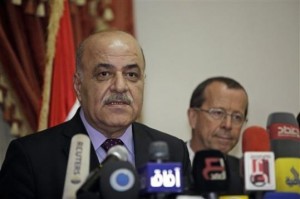ASSOCIATED PRESS

Gorguis Yacoub, left, representative of Iraqi prime minister Nouri al-Maliki speaks to journalists during a joint press conference with Martin Kobler, right, top U.N. envoy to Iraq, in Baghdad, Iraq, Thursday, Nov. 3, 2011. The top U.N. envoy to Iraq is offering to broker the peaceful closing of a camp of Iranian exiles before the government in Baghdad forces its residents out at the end of the year. (AP Photo/Karim Kadim)
BAGHDAD (AP) — In a last-ditch attempt to head off a confrontation, the top U.N. envoy to Iraq on Thursday offered to broker the peaceful closing of a camp of Iranian exiles before the government in Baghdad forces its residents out at the end of the year.
An aide to Prime Minister Nouri al-Maliki said Iraq’s Cabinet would consider easing its deadline if a solution can be agreed on quickly.
At issue is a group of about 3,300 exiles at the remote Camp Ashraf in Iraq’s eastern Diyala province who seek the overthrow of Tehran’s clerical rulers. Members of the People’s Mujahedeen Organization of Iran, they won refuge at Ashraf decades ago during the regime of Saddam Hussein, a Sunni who saw them as a convenient ally against Tehran’s theocracy.
Since Saddam’s fall in 2003, the exiles have become an irritant to Iraq’s Shiite-led government, which is trying to bolster ties with Iran.
A deadly April raid on the camp by Iraqi forces drew international criticism of Baghdad’s treatment of the group. Al-Maliki responded by pledging to deport the Ashraf residents by the end of the year. The Ashraf residents fear they will be sent back to Iran and imprisoned or persecuted.
“There is a number of problems that still have to be solved,” U.N. envoy Martin Kobler said at a news conference in Baghdad. “This needs time, this needs space.”
He added: “The situation, as it is, is not satisfactory, neither to Camp Ashraf residents nor to the government nor to the international community.”
Kobler said he would seek to start talks after weeklong Muslim Eid al-Adha observance, which begins Sunday.
Ashraf residents are trying to win asylum in the United States, Canada and countries in the European Union but have not been widely successful. The U.S. considers the People’s Mujahedeen a terrorist organization, although the European Union removed it from its terror list several years ago.
Also at the news conference was al-Maliki aide Gorguis Yacoub who, in a turnabout for the government, opened the possibility that the deportation deadline could be extended. He said that decision would be up to the Cabinet, repeating the government’s stance that it wants the Ashraf residents out of Iraq by the end of the year.
Asked if the Cabinet would grant an extension, Yacoub said it would be a possibility “if there to be quick measures in order to achieve” a resolution.
In a statement, Ashraf spokesman Shahriar Kia said the deadline should be canceled outright to give all sides enough time to resolve the years-long dispute. He noted that legislators across the world — including some in Congress and the European Parliament — have demanded that the residents be granted refugee status, which would protect them.
Kia said Ashraf residents have been especially fearful in the last few days after additional Iraqi troops began gathering outside the camp’s gate and waking them up with taunts broadcast through loudspeakers during early morning hours. Iraqi troops took similar actions just before the deadly April 8 raid that left dozens dead.
Journalists are barred from entering Camp Ashraf, and U.N. monitors have been given only limited access. Kia called on the government to withdraw its troops and allow a U.N. monitor to be stationed at the camp.
“Anything less than this is a prelude to the massacre of the residents and a worst repeat of previous bloodbath,” he said.
___
Associated Press Writer Sameer N. Yacoub contributed to this report.
